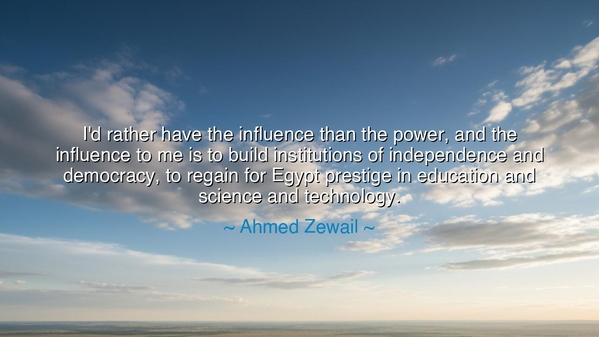
I'd rather have the influence than the power, and the influence
I'd rather have the influence than the power, and the influence to me is to build institutions of independence and democracy, to regain for Egypt prestige in education and science and technology.






There are men who seek power, and there are men who seek purpose — and in that difference lies the measure of true greatness. When Ahmed Zewail, Egypt’s Nobel laureate in Chemistry, said, “I’d rather have the influence than the power, and the influence to me is to build institutions of independence and democracy, to regain for Egypt prestige in education and science and technology,” he spoke not as a politician, but as a sage. His words shimmer with the ancient wisdom of his homeland — a land that once built pyramids and libraries, temples and philosophies, where the pursuit of knowledge was sacred. Zewail’s dream was not to rule his people, but to uplift them, to kindle once more the intellectual flame that had long illuminated Egypt’s place in the world.
To understand his meaning, one must see the contrast between influence and power. Power commands; influence inspires. Power imposes laws; influence plants ideas. Power fades when its holder falls, but influence lives on, carried in the hearts and minds of generations. Zewail understood that nations are not renewed through force, but through education, through institutions, through the quiet shaping of character and thought. He desired not the scepter of authority, but the seed of transformation — for he knew that a single wise idea can outlive a thousand decrees.
In the history of mankind, those who chose influence over power have changed the world more deeply than kings. Consider Socrates, who had no throne, no army, no wealth. Yet by questioning, teaching, and awakening reason, he altered the very foundation of Western thought. Or Mahatma Gandhi, who refused the might of violence but wielded moral influence so vast that it broke an empire. Like them, Zewail’s battlefield was not political, but intellectual. He believed that a people’s liberation begins not with conquest, but with knowledge, and that independence of the mind precedes independence of the state.
Zewail spoke for a new Egypt — not the Egypt of the pharaohs, nor of foreign dominion, but of modern rebirth. His vision was to build institutions of independence and democracy, places where learning would be free from corruption and servitude. He sought to restore the prestige of Egypt in education, science, and technology, not for glory’s sake, but to awaken a generation capable of shaping its own destiny. For centuries, Egypt had been a teacher to the world; Zewail dreamed of returning it to that noble role — a beacon of wisdom, not merely a student of others’ progress.
And yet, his choice of words — “I’d rather have the influence than the power” — reveals humility. He knew that influence requires patience, while power tempts immediacy. The man of influence builds cathedrals of thought brick by brick, often without seeing them finished. The man of power, in his haste, builds monuments that crumble when his reign ends. Zewail chose the path of endurance — the path of those who sow knowing they may not reap, but trusting that others will harvest in time.
In his life’s work, he embodied his creed. Through his scientific discoveries, his advocacy for reform, and his establishment of institutions like the Zewail City of Science and Technology, he gave his people tools greater than gold — the tools of curiosity, discipline, and hope. He became not just a scientist, but a builder of civilizations. For the strength of a nation lies not in its armies or its rulers, but in the independent minds of its people — minds unafraid to question, to create, to imagine.
So, my child, learn this from Zewail’s wisdom: do not chase power, for it passes like a shadow at dusk. Seek instead influence — the kind born from service, knowledge, and integrity. Build what lasts beyond you: schools, ideas, acts of goodness, examples of courage. Be the architect of independence, not its occupant. For true greatness is not to rule others, but to awaken the greatness within them. In doing so, you will join the lineage of those rare souls — from Socrates to Gandhi to Zewail — who, without armies or crowns, reshaped the destiny of humankind through the silent, eternal force of enlightenment.






AAdministratorAdministrator
Welcome, honored guests. Please leave a comment, we will respond soon